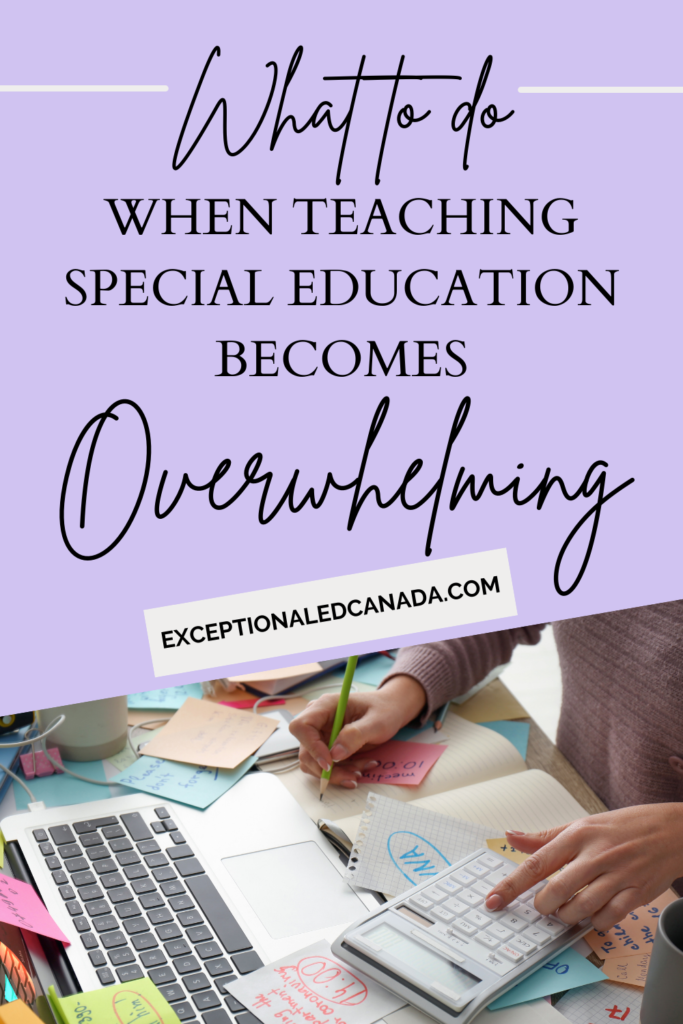What do you do when you discover that teaching special education can be overwhelming?
It’s 8am and I have just arrived at school for the day. Coffee…check, Converse…check, Walkie Talkie…check. The day begins with support staff helping students coming in from the buses eager to start their day (usually).
This day, one student comes in with heightened behaviours. It’s all hands on deck to support the student. While this is happening, there are absent support staff who need to be covered so the schedule must be adjusted.
It is now time to start the class for the day. I have morning slides prepared, visual schedules set, independent work stations organized, and centers ready to go. Thankfully, I set all of that up yesterday. Most days I am prepared, but some days…I’m just not.
Does any of this sound familiar to you? If so, you must be a special education teacher. This is a role that is extremely rewarding, yet challenging at the same time.
There are many different pieces and parts that have to come together to make the day a success. Even with the best laid plans, however, the day can go askew. So what do you do when everything involved in teaching special education can be overwhelming?
Why teaching special education can be overwhelming?
Special education is a very unique role in that it is extremely specialized and individualized to each student. Because of this, it can be a lot to manage. There is a very steep learning curve when going from another grade or subject to special education.
Having said that, there are so many amazing things that happen in your day. Putting the work and effort into the program has hands down been worth every bit of overwhelm and effort.
I find that in writing this blog post I am hesitant to discuss the overwhelming parts of the role. I don’t want to discourage anyone from taking on this role. I would do it again in a heartbeat.
There is a level of overwhelm and stress with any teaching role. Special education is not unique in that regard, but it is a different kind of overwhelm and stress.
I do think it’s important, though, to talk about the emotions and stress that come with the role. I know that I often felt like I was doing something wrong because I felt so overwhelmed. I am hoping that I can help even one of you to feel that you are not alone.
All the Moving Parts
In special education there are so many moving parts. Many aspects of your programming are individualized to the student. This creates challenges in planning and prepping. Once that is done, however, it becomes a matter of sticking to the plan as best you can.
Often, however, there are things that come up which can derail your plans. This could be student behaviours, medical emergencies, staff absences, etc. Inevitably, something is going to come up in the day that you did not plan.
The challenge and stress is sometimes in the unknown. You don’t know what you are going to get on any given day. It can be hard to have a plan for the day and then find that absolutely nothing has gone according to that plan.
This happens because there is an unpredictable nature to this very special group of students. I always remember that it is actually much more stressful and challenging for the students than it is for me when things become chaotic.
This is why it is important to have as much structure as possible. This is especially true when things don’t go as planned. So what can you do to manage the unpredictability and overwhelm of teaching special education?

What can I do to make teaching special education more manageable?
Set Boundaries
I find teaching special education can lead to taking on way more than I can handle. For me, this happens because I want the absolute best for my students. I will always give everything I have and more for them to be successful.
Ultimately, though, this is a recipe for disaster.
I have been told “you can’t pour from an empty cup”. I have found out the hard way that this is very true. To be a benefit to my students, I have to take care of myself first.
One way to do this is to set boundaries for what I can and can’t do. I do this by having non-negotiable days and times that work has to be done.
For example, I know that I want to be home and present with my own kids and husband. This is why at 4:30pm, I am done for the day. Whether I have finished what I needed to do or not.
Having a hard stopping time is crucial for me. Without it, I tend to just keep working.
For me, this hard stop also includes not thinking about the day or the things that happened (or didn’t). This might not be the case for everyone. I find myself still emotionally or mentally impacted by things that happened in the day.
It is not easy to do, and it takes practice, but having a mental and emotional break from the day has become so beneficial for me. At first, I would spend some time when I got home doing a brain dump. Once I had all of that out of my head, I would do a short guided meditation. I have found that, for me, this combination allowed me to be present with my family.
Make a Plan

Despite the fact that often things don’t go according to plan, I find that having a structure to my day helps me to feel more settled. Also, when things go off course, having a plan gives you a quick way to know where to get back on track. This allows you to easily know where to start without having to give it too much thought.
The mental exhaustion that comes with the role is very real. Especially when you spend your day putting out fires. The less you have to decide or think about after you have been thrown a curveball the better.
Planning and preparing has several different parts. Of course, there is lesson, unit, and IEP goal planning. There are also daily plans and schedules. Spending some time at the beginning of a semester deciding on your schedule is certainly worth the effort.
Planning and organization systems vary greatly. These can change depending on your style and preference. For me, I find having an “ideal day” and “ideal week” type setup works best. Then, when things get off track, I have a plan of where to start to get back on track.
Let it Go

This is definitely one of the most challenging parts of any job. It is extremely easy to get caught up in the various challenges in the day. This is especially true as an educator. You have school politics and dynamics, challenges with parents, student behaviours, mountains of work, etc. etc.
At the beginning of my career, before I was in special education, I found myself overwhelmed with things that seemed unfair, frustrating, or if I’m being honest, completely infuriating.
When I moved into special education, this seemed to be much more amplified.
I spent many years stressed, frustrated, and angry. Usually about things that were completely out of my control. Over time, and with some strategies, I have learned how to let things go when I can. At the end of the day, the impact to your health, both mental and physical, is just too much.
Look out for a future post where I am going to talk about ways that we can manage the emotions that come with these challenges.
Ask for Help

It can be hard to reach out to others, especially when you are new in a role. I always felt that I would be judged for not knowing what I was doing.
I can say that, as a special education teacher who has some years in, I am always more than happy to help anyone who needs it. I don’t find myself judging others, instead I want to help in a way that I would have liked someone to help me.
Finding a mentor in teaching, especially in special education, can really make a difference. Don’t be afraid to connect with other teachers.
Alternatively, you can find some really great communities online. My only hesitation here is that sometimes you come across other teachers who are a bit jaded. But that is not really the norm, in my experience.
What I have found is that communities of teachers are a really great resource for strategies, tips, tricks, and just an outlet when you are feeling overwhelmed. It really helps to talk to someone who has been there and knows what you are going through.
Self Care
When we think of self care, we often think about those relaxing things we do like taking a bath or getting our nails done. While absolutely important, especially if they bring you joy, they are not the only ways we can care for ourselves.
Journaling

Self care can look different for each of us. For me, I find journaling a big part of my self care routine. I actually have several types of journals that I use for various things. I have a morning journal where I start the day with a stream of consciousness. This can also look like a brain dump on some days.
I also have a bullet journal where I set goals and priorities for the month and week. This is more of an organizational thing that I use personally, but I also have spreads that work for the teaching side of me.
A gratitude journal has actually been more beneficial than I expected it to be. It is a great way to be mindful of what you have around you and brings a positive vibe to your day.
I also find that doing a brain dump just before bed is also helpful because it clears my mind before I go to sleep.
Creative Outlet

Another thing that I do for self care is to paint, draw and colour. This is what works for me, and can look different for others.
If you are a creative person, having time built into your day to be creative, even if it is just for a short amount of time, can be a really good benefit to your mental health.
Reading

For me, reading is a way to escape all of the pressures and emotions of the day. Again, this is not something that will work for everyone, but for me it has been a real benefit.
Meditation

On days when I am feeling extremely overwhelmed, I will go in to a quiet room and do a guided meditation. This gives me pause from the sensory overload that can happen in a really chaotic day. I will often do another meditation as I am falling asleep. I’m sure there are downsides to listening to a meditation as I fall asleep, but for me it is a way for my mind to clear so that I can sleep.
I know that not everyone has the ability to work this into their lives, but it really is worth the effort if you can manage it because it provides a significant benefit to my mental health.
Find what works for you
I don’t think there is a formula or a standard list of self care that will work for everyone. The point is to make time for something that allows you to decompress, process your day, calm your mind, and be present with your loved ones at the end of the day.
Teaching special education can be overwhelming, but it is so worth it!
I want to reiterate that I am not intending to sway anyone from taking on a role in special education. Teaching special education has been one of the most rewarding things I have done.
I truly do believe that it is worth every bit of effort. There are stresses in many jobs, these strategies are really not just unique to special education.
The point I am trying to make in this blog post is that teaching special education can be overwhelming, but so rewarding. It is finding ways to manage and reduce the overwhelm that can be a real benefit as you continue in this role. I hope you have found something useful here to help you feel like you are not alone.
What Next?
Thanks so much for staying with me through this post. I welcome you to reach out to me anytime if you are struggling with your classroom and I will do my best to help! If you try any of these self care strategies, tag me on Instagram or Facebook letting me know how it goes!
I would love for you to send me an email if you have any requests for future topics, or ideas for resources you would love to see.
You can also check out the special education resources I have available in my TPT, Etsy, or TeachShare shop.
Looking forward to hearing from you!!